Farmer’s lung, or “hypersensitivity pneumonitis”, is a disease that occurs in the lungs as a result of an allergic reaction to dust or spores. Symptoms include shortness of breath, cold- or flu-like symptoms, which can progress into pneumonia. If left untreated, it can cause fibrosis on the lungs and long-term damage to the lungs.
The dust or spores can be prevalent in poorly conserved hay or straw and farmers feeding out these materials are at a high risk of contracting farmer’s lung. The high-risk period is in the winter time when the weather is cold and wet.
Prevention
As poorly conserved hay or straw is a key cause, making sure feed material is preserved properly is a first step. Wearing dust masks when working in dusty environments is also very important.
If you have been in contact with mouldy or dusty feed and you feel unwell, visit your doctor straight away. Make him/her aware that you have been in contact with the materials in question as this could aid the diagnosis and treatment.
A study in 2014 found that there is a high prevalence of respiratory problems in farmers. The Irish farmer’s lung health study, undertaken by investigators from University Hospital Galway and Saolta University Health Care Group, was prompted by prevalence of respiratory problems in farmers in other countries and by reports of increasing mortality rates within the Irish farming community.
The study took place at the 2013 National Ploughing Championships, where over 400 farmers agreed to complete an investigator-delivered questionnaire and undergo lung function testing. Almost two-thirds reported one or more chronic respiratory symptoms.
Professor Anthony O’Regan, consultant respiratory physician at University Hospital Galway, said at the time: “Remarkably, almost two-thirds reported one or more chronic respiratory symptoms. Most were non-smokers (91%), yet 13% had a pre-existing diagnosis of obstructive lung disease and 12% demonstrated abnormal lung function. Unlike non-farming populations, obstruction on lung function testing was not associated with smoking but appeared to occur in those patients with symptoms or a prior diagnosis of asthma or hay fever.”
With silage pits being opened around the country, it is important to take safety precautions around working at heights. Plastic silage covers when wet can be very slippy and every year we hear of falls occurring at or around silage pits.
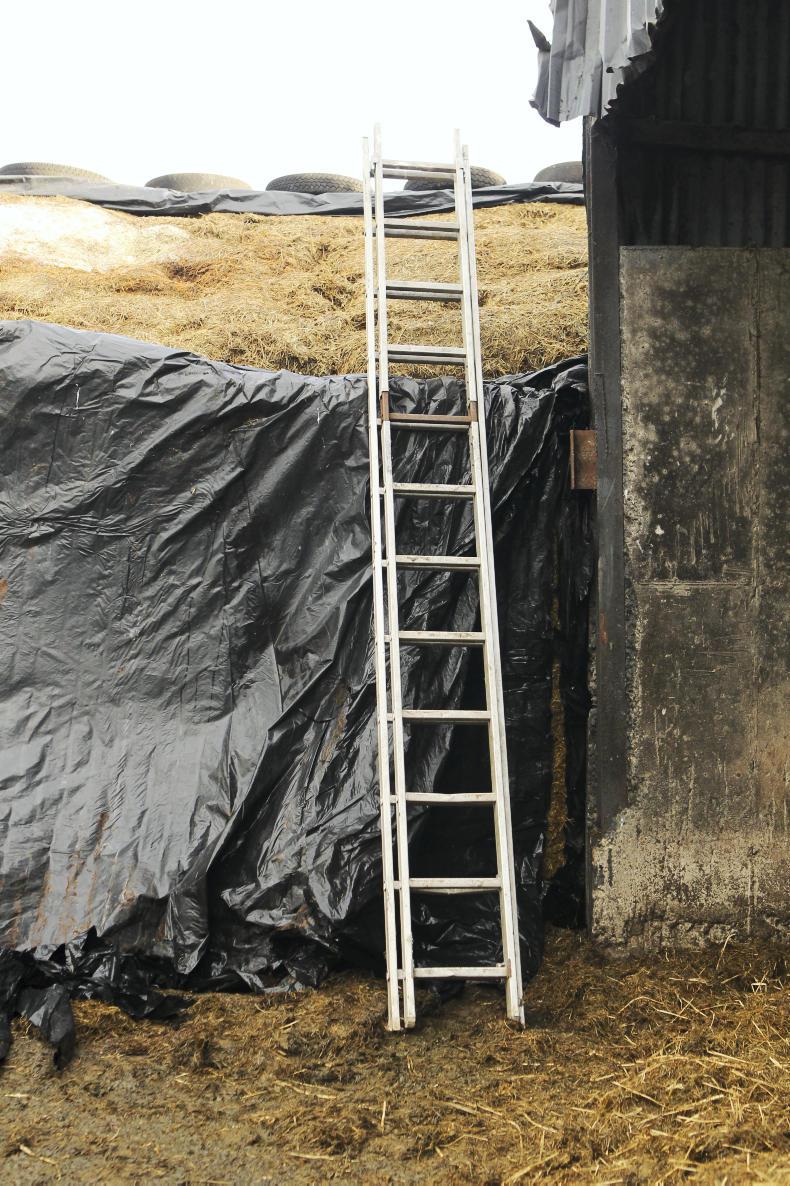
Try to complete silage work during daylight hours, if possible.
Try to strip silage pits on dry days where there is little or no wind to avoid the cover blowing around. Try to complete this work during daylight hours as well, if possible. Use the safety rail on top of the wall to avoid falls.
Take care as you take bales out of hay and straw stores. While the hay and straw may have been stacked correctly in the summer/autumn, it may have shifted since and falling bales can be a dangerous hazard when taking bales out of sheds.
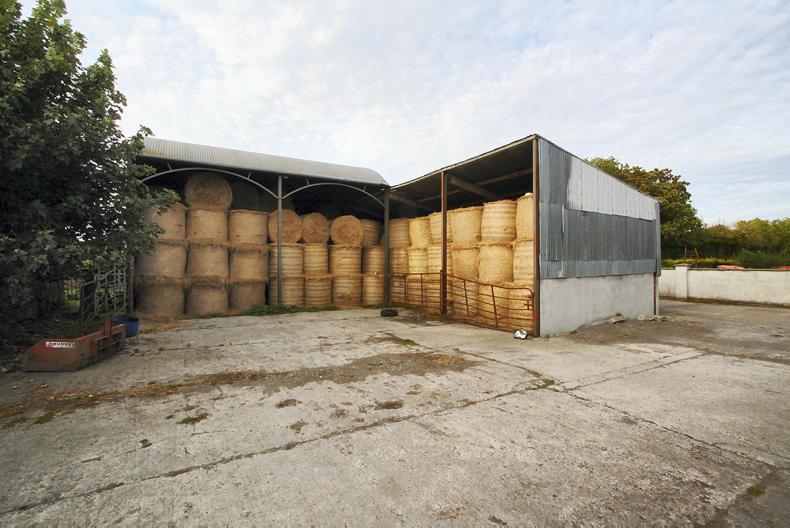
Make sure there are no people around the base of the stack as bales are taken out.
Make sure there are no people around the base of the stack as bales are taken out. Never leave a bale that looks as if it may fall. You are better to knock these bales to ground level to reduce the risk of them falling on somebody in the yard.
It is important that the shear grab is at ground level when not in use. Leaving it up high can be a serious safety risk to walk into. Take care when feeding along feed barriers opening and closing shear grabs to avoid causing harm to livestock.
As many part-time farms will be feeding and doing jobs in darkness in both the morning and evening at this time of year, it is important that the yard area has adequate lighting to avoid any trips or falls. It is also important that tractors have good lighting with beacons working for winter months.
With stock bulls housed, they pose a risk during tasks like feeding and cleaning out. Never enter a pen with a bull and feed from outside the pen. If you need to clean out a pen, move the bull into a separate pen first.
Feed stores can become infested with vermin such as rats and mice at this time of year. 
Rats pose a serious health risk through coming into contact with their urine. This can aid the spread of disease such as leptospirosis and Weil’s disease. Invest in a box of disposable gloves to wear when feeding in the yard. Also make sure to wash hands thoroughly after handling potentially contaminated material. Make sure you have a vermin control plan around the farmyard.
Farmer’s lung, or “hypersensitivity pneumonitis”, is a disease that occurs in the lungs as a result of an allergic reaction to dust or spores. Symptoms include shortness of breath, cold- or flu-like symptoms, which can progress into pneumonia. If left untreated, it can cause fibrosis on the lungs and long-term damage to the lungs.
The dust or spores can be prevalent in poorly conserved hay or straw and farmers feeding out these materials are at a high risk of contracting farmer’s lung. The high-risk period is in the winter time when the weather is cold and wet.
Prevention
As poorly conserved hay or straw is a key cause, making sure feed material is preserved properly is a first step. Wearing dust masks when working in dusty environments is also very important.
If you have been in contact with mouldy or dusty feed and you feel unwell, visit your doctor straight away. Make him/her aware that you have been in contact with the materials in question as this could aid the diagnosis and treatment.
A study in 2014 found that there is a high prevalence of respiratory problems in farmers. The Irish farmer’s lung health study, undertaken by investigators from University Hospital Galway and Saolta University Health Care Group, was prompted by prevalence of respiratory problems in farmers in other countries and by reports of increasing mortality rates within the Irish farming community.
The study took place at the 2013 National Ploughing Championships, where over 400 farmers agreed to complete an investigator-delivered questionnaire and undergo lung function testing. Almost two-thirds reported one or more chronic respiratory symptoms.
Professor Anthony O’Regan, consultant respiratory physician at University Hospital Galway, said at the time: “Remarkably, almost two-thirds reported one or more chronic respiratory symptoms. Most were non-smokers (91%), yet 13% had a pre-existing diagnosis of obstructive lung disease and 12% demonstrated abnormal lung function. Unlike non-farming populations, obstruction on lung function testing was not associated with smoking but appeared to occur in those patients with symptoms or a prior diagnosis of asthma or hay fever.”
With silage pits being opened around the country, it is important to take safety precautions around working at heights. Plastic silage covers when wet can be very slippy and every year we hear of falls occurring at or around silage pits.

Try to complete silage work during daylight hours, if possible.
Try to strip silage pits on dry days where there is little or no wind to avoid the cover blowing around. Try to complete this work during daylight hours as well, if possible. Use the safety rail on top of the wall to avoid falls.
Take care as you take bales out of hay and straw stores. While the hay and straw may have been stacked correctly in the summer/autumn, it may have shifted since and falling bales can be a dangerous hazard when taking bales out of sheds.

Make sure there are no people around the base of the stack as bales are taken out.
Make sure there are no people around the base of the stack as bales are taken out. Never leave a bale that looks as if it may fall. You are better to knock these bales to ground level to reduce the risk of them falling on somebody in the yard.
It is important that the shear grab is at ground level when not in use. Leaving it up high can be a serious safety risk to walk into. Take care when feeding along feed barriers opening and closing shear grabs to avoid causing harm to livestock.
As many part-time farms will be feeding and doing jobs in darkness in both the morning and evening at this time of year, it is important that the yard area has adequate lighting to avoid any trips or falls. It is also important that tractors have good lighting with beacons working for winter months.
With stock bulls housed, they pose a risk during tasks like feeding and cleaning out. Never enter a pen with a bull and feed from outside the pen. If you need to clean out a pen, move the bull into a separate pen first.
Feed stores can become infested with vermin such as rats and mice at this time of year. 
Rats pose a serious health risk through coming into contact with their urine. This can aid the spread of disease such as leptospirosis and Weil’s disease. Invest in a box of disposable gloves to wear when feeding in the yard. Also make sure to wash hands thoroughly after handling potentially contaminated material. Make sure you have a vermin control plan around the farmyard.






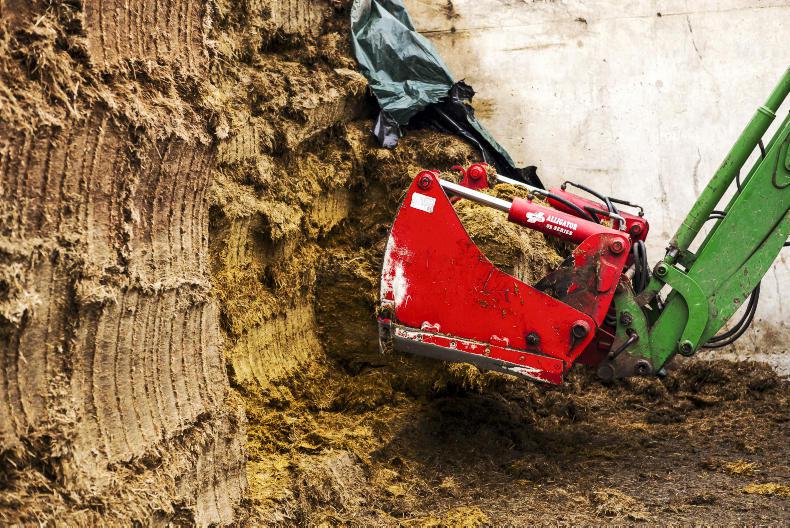



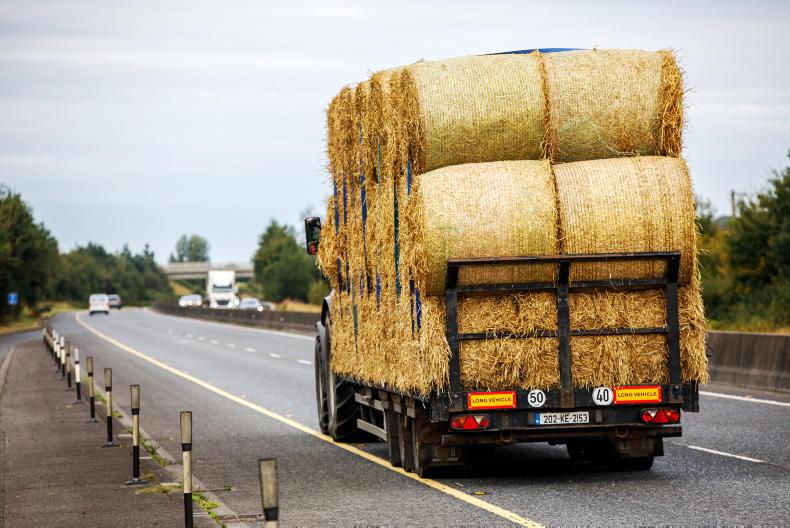
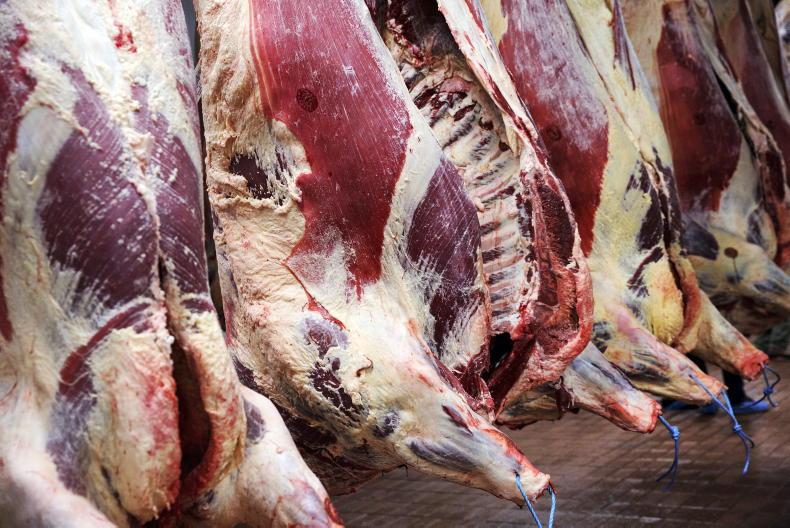
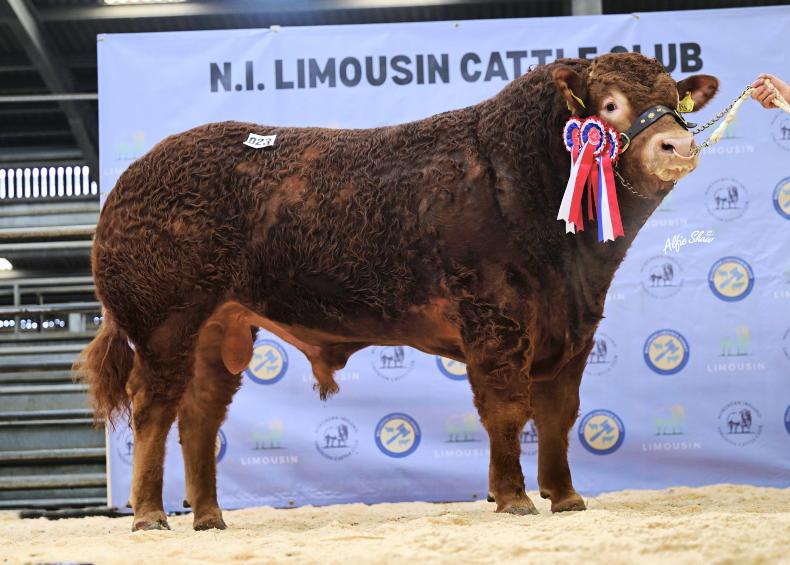
SHARING OPTIONS